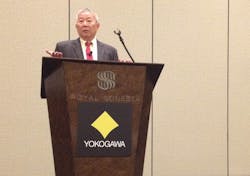No longer just a tool used simply for automation control, there is much more expected from industrial automation today. There is considerably more data coming from a plant today, and that system must be able to better manage the relevant information, manage production as a total business unit, and really be used as a business tool, not just a control tool.
That was the message from Simon Lam, a longtime oil and gas executive, talking about what business users like himself expect from automation suppliers. Lam set the tone for the Yokogawa Users Conference this week in Houston during his keynote presentation this morning.
Lam served in various executive positions at Shell, including chief executive of CSPCL, a multibillion-dollar petrochemical joint venture between China National Offshore Oil Company (CNOOC) and Shell. Although he retired from Shell in 2007, he has rejoined the industry several times since, helping companies run their businesses. He is currently advisor to the chairman of Jurong Aromatics, an oil and petrochemical producer in Singapore.
In his approximately 40 years in the oil industry, Lam has seen considerable change in the industrial automation landscape—moving from analog to digital processes, the ability to handle much more complexity, and more integrated plant information up to the enterprise level. Huge operations that could never be managed as a single entity can now be operated with a single automation system. As Lam puts it, “It’s quite a change.”
With the increasing complexity, Lam noted, has come more reliance on the automation vendor. The trend is to move away from looking at the vendor as just a cost factor and instead seeing it as a value-added partner for growth.
This is particularly true as businesses struggle to lower operating costs, optimize processes, and improve production safety—all with a dilution of technical resources and experiences to operate and manage change, Lam said. “With this reduction in the technical know-how and people, human reliability is an important factor,” he said. “You may have the best systems in the world…but in the end, whether a plant reaches the best profitability, depends on the people.”
There is increasing scrutiny of industry from the public, which—particularly given the number of incidents heard about in recent years—no longer assumes everything is running OK in industrial operations. Lam expressed concern about operators not having the chance to train their skills. Presented with a critical situation, he said, “many of them, after six years of stable operation, just don’t know what to do.”
Beyond the minimum requirement of a reliable distributed control system (DCS) there needs to be software, for example, that enhances training (and retraining) of operators through dynamic simulators. The use of artificial intelligence could capture operator experience to avoid operations mishaps. The software should also enhance safety management through an intelligent alarm management system. “Integrity of the system is critical,” he said. “Management of change is critical.”
The software needs to not only reduce costs, but optimize production to get the most out of the feedstock. “Some refineries look at cost only, but many refineries nowadays have to face increasing competition,” he said. “Being able to squeeze the maximum profit on each drop of feedstock becomes increasingly important.”
Overall, an automation supplier needs to understand the business concerns and challenges that the industry faces; and needs to collaborate actively with companies and consultants. “They can provide some of the expertise to help me do my work,” Lam said, noting also the importance of a long-term relationship. “You have to be absolutely sure who you’re getting into bed with.”
About the Author
Aaron Hand
Editor-in-Chief, ProFood World

Leaders relevant to this article:
